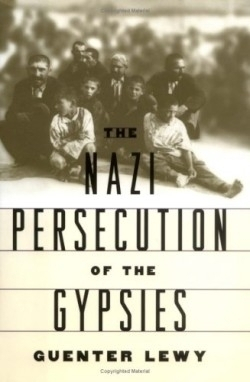The Nazi Persecution of the Gypsies
Gypsies, by their very nature, affronted the principles of social order, hard work and racial purity espoused by the Nazis. Lewy, in his well researched, comprehensive study, traces the evolution of Nazi policies from one of general disinterest when Hitler first came to power to one concerned with “social conduct” as evidenced by Gypsies “itinerant” and “workshy” lifestyle. Only later, Lewy shows, did Nazi policy, reflecting an obsession with racial purity, promulgate sterilization and incarnation.
But even then, although there were deportations to concentration camps from which no one was expected to return, there was no “final solution” for gypsies analogous to the systematic extermination of the Jews. This was so, in part, because the gypsies were protected by Himmler’s belief that Gypsies were descendants (or at least closely related) of a very early Indo-Germanic people and as such should to be allowed “a certain freedom of movement, so that they can itinerate in a fixed area, live according to their customs and mores and follow an appropriate traditional occupation.”
Because of this perceived Aryan origin, “pure” Gypsies could, in Himmler’s mind, be considered potentially valuable as an addition to the German blood pool and thus deserving of some protection. Mixed blood (mischlinge) Gypsies, however, were given no special consideration.
Basically, because there was a gradual radicalization of Nazi policy toward the Gypsies, because the actual number of Gypsy victims cannot be accurately determined, and because it is impossible to demonstrate the existence of “a priori program to destroy the Gypsies,” Lewy breaks ranks with many historians, especially those in the Gypsy community, in his refusal to use the terms “genocide” or “holocaust” in relation to the horrendous losses of life experienced by the Gypsies under the Nazis. Lewy believes that although the Gypsies were sent to concentration camps for stays of unlimited duration and although they experienced very high death rates, there was no program or policy of systematic destruction of Gypsies in place.
Lewy, a Professor Emeritus of Political Science at the University of Massachusetts, has written a reasoned, academic overview of the often historically neglected Nazi persecution of the Gypsies. The book is very accessible to the general reader, filled with poignant details of individual and community struggles with the growing Nazi terror.
Reviewed by
David Reid
Disclosure: This article is not an endorsement, but a review. The publisher of this book provided free copies of the book to have their book reviewed by a professional reviewer. No fee was paid by the publisher for this review. Foreword Reviews only recommends books that we love. Foreword Magazine, Inc. is disclosing this in accordance with the Federal Trade Commission’s 16 CFR, Part 255.

